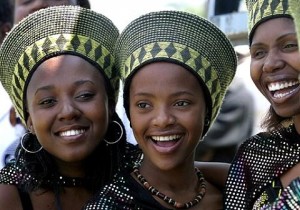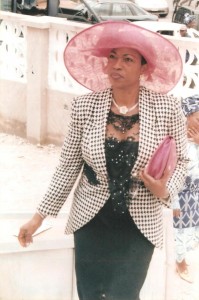Lessons from my Mother: African Women and Feminism
 Yesterday, countries around the world celebrated International Women’s Day (IWD), a day during which thousands of events — political rallies, business conferences, government activities, networking events, local women’s craft markets, theatric performances, fashion parades and more – are held to inspire women and celebrate achievements in gender equality.
Yesterday, countries around the world celebrated International Women’s Day (IWD), a day during which thousands of events — political rallies, business conferences, government activities, networking events, local women’s craft markets, theatric performances, fashion parades and more – are held to inspire women and celebrate achievements in gender equality.
This year’s theme, “Connecting Girls, Inspiring Futures,” called for intentionally including young girls in the discussion and creatively brainstorming solutions for bridging the divide between generations. Hence, Gender Across Borders hosted a successful live blogging event, in which over 200 blogs explored a plethora of ideas such working with girls in conflict areas, protesting female genital cutting, investing in girls leadership,  and — the piece I wrote — women writing their way back into history. In an attempt to highlight African women’s contributions to IWD, I also created a “Africa on IWD” board on Pinterest. You can view the board here.
Looking at the colorful collection of images, videos, and blog posts of African women celebrating all across the continent invoked mixed feelings; on one hand, I was proud to see African women, both individuals and organizations, respond in droves to the call, but on the other hand, being so far away from home on IWD made me a tad homesick, causing me to reflect on how it is I came to be so involved in women’s issues.
I attended an international primary school, where International Women’s Day was a chance for all of us to celebrate women from different cultures via music, art, dance, and charity. Often, students would read inspiring facts about women from their home countries, followed by traditional dance and music performances, international food expos, and a myrid of opportunities for students and their families to learn and give back. Yet, global women’s activism wasn’t just tied to my school’s programming.
Growing up in Nigeria, the idea that improving the lives of women was a cause worth fighting for didn’t just come from organizations, or brochures, or formal programming; I had strong women around me who constantly put this into practice in the every day, including my own mother.
 As a child of the Biafran war and the first daughter of her family, my mother faced the heavy burden of supporting her family through the loss of a number of relatives, including her own mother who died from sickness. To this day, she credits the support of women’s organizations for her survival. And thus, she committed herself to charity from a very early age. I remember my mother telling me about the one night she’d prayed the hardest to God; it was during a bomb raid. She’d close her eyes and clasp her hands together as she’d recount the promise she made to God that if she made it through the night, she’d dedicate the rest of her life helping people, much like the older women — human rights advocates, volunteers, missionaries — who had risked their lives during the war in order to deliver relief to the region in which she lived — food, clothing, sanitary pads. She’d trek over 10 miles back and forth every day just to deliver food and drinking water to her family, but she never really emphasized the distance; what remains with her is the memory of dedicated women that were waiting to receive her on the other side.
As a child of the Biafran war and the first daughter of her family, my mother faced the heavy burden of supporting her family through the loss of a number of relatives, including her own mother who died from sickness. To this day, she credits the support of women’s organizations for her survival. And thus, she committed herself to charity from a very early age. I remember my mother telling me about the one night she’d prayed the hardest to God; it was during a bomb raid. She’d close her eyes and clasp her hands together as she’d recount the promise she made to God that if she made it through the night, she’d dedicate the rest of her life helping people, much like the older women — human rights advocates, volunteers, missionaries — who had risked their lives during the war in order to deliver relief to the region in which she lived — food, clothing, sanitary pads. She’d trek over 10 miles back and forth every day just to deliver food and drinking water to her family, but she never really emphasized the distance; what remains with her is the memory of dedicated women that were waiting to receive her on the other side.
My mother’s life was spared and she kept her promise. Inspired by the circumstances she’d witnessed her own family go through after the loss of her own mother, she founded and led the first program in the country to advocate for the rights of women who had lost the heads of their households and had young children to care for (The Widows Trust Fund).  Later on, she became president of the International Women’s Society, an organization that works for the advancement of women and children in Nigeria. As a social entrepreneur, she founded Garden of Zinnia, an organization that creates holiday gift baskets — a popular tradition in Nigeria — by partnering with local vendors i.e. market women, local artists and craftspeople. Every year, hundreds of people — from the elderly basket-weavers to the young girls who sell the wrapping ribbons — rely on my mother’s unwavering commitment to supporting women who are working to support their families.
As a young girl, I remember accompanying my mother to meetings, fundraisers, award ceremonies and the like filled to the brim with inspiring African women. I witnessed my mother giving awards as well as receiving them. I didn’t understand the word “feminism” when I first heard it, but I watched my mother’s active mentorship of the young women she invited into our home and took under her wing. I didn’t understand the term “economic empowerment” when I first heard it, but I saw my mother apply this principle in her work as a business owner each year she refused to replace local products in her gift baskets with expensive imports from overseas. My family never sat around discussing women’s liberation at the dinner table; my mother never thought to write about her experience as an African woman navigating gender, war, and poverty; she simply lived the principles she believed in. It is because I watched my mother, that I strongly believe in applied advocacy for women’s issues in all its forms — gender equality, LGBT human rights, and women’s visibility in media — not just as a celebration on a single day, but as a way of life; not just as ideas to be talked about, but work to be done.
I appreciate the 2012 International Women’s Day theme — Connecting Girls, Inspiring Futures — for the reminder that women’s contributions to the world don’t always have to come in press releases, or conferences, or non-profit programs to make a difference; that sometimes, the greatest impact is felt within the scope of the every day; that my mother is a woman worth celebrating; and that, I — the first daughter of my family, a proud afrofeminist, women’s and media activist, tirelessly fighting for gender equality — am the future she inspired.
Question to Readers: Did your relationship with your mother — or other parental figure — shape your activism? influence your politics? If so, how?

